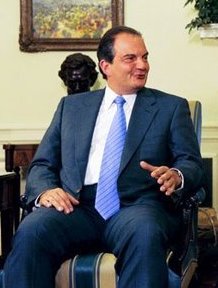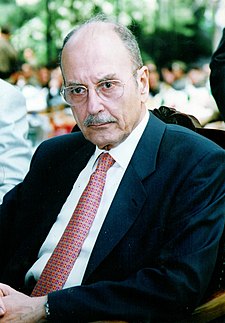
Konstantinos G. Karamanlis, commonly anglicised to Constantine Karamanlis or just Caramanlis, was a four-time Prime Minister and twice President of the Third Hellenic Republic, and a towering figure of Greek politics whose political career spanned much of the latter half of the 20th century.

Konstantinos G. Simitis, usually referred to as Costas Simitis or Kostas Simitis, is a Greek politician who served as Prime Minister of Greece and was leader of the Panhellenic Socialist Movement (PASOK) from 1996 to 2004.

The Panhellenic Socialist Movement, known mostly by its acronym PASOK is a social-democratic political party in Greece.

Parliamentary elections were held in Greece on 7 March 2004. The New Democracy Party of Kostas Karamanlis won the elections, ending eleven years of rule by the Panhellenic Socialist Movement (PASOK). PASOK was led into the elections by George Papandreou, who succeeded retiring Prime Minister Costas Simitis as party leader in February.

Konstantinos A. Karamanlis, commonly known as Kostas Karamanlis, is a Greek politician who served as Prime Minister of Greece from 2004 to 2009. He was also president of the centre-right New Democracy party, founded by his uncle Konstantinos Karamanlis, from 1997 to 2009, and he is currently a member of the Hellenic Parliament.

The New Democracy, also referred to as ND (ΝΔ) by its initials, is a liberal-conservative political party in Greece. In modern Greek politics, New Democracy has been the main centre-right political party and one of the two major parties along with its historic rival, the Panhellenic Socialist Movement (PASOK). Having spent two and a half years in government under the presidency of Antonis Samaras, New Democracy lost its majority in the Hellenic Parliament and became the major opposition party after the January 2015 legislative election.

Konstantinos Mitsotakis was a Greek politician who was Prime Minister of Greece from 1990 to 1993. He graduated in law and economics from the University of Athens.
Tzannis Tzannetakis was a Greek politician who was briefly Prime Minister of Greece during the political crisis of 1989.

Antonis Samaras is a Greek politician who was Prime Minister of Greece from 2012 to 2015 and leader of New Democracy from 2009 to 2015. Samaras previously served as Minister of Finance in 1989, as Minister of Foreign Affairs from 1989 to 1992, and as Minister of Culture and Sport in 2009.

Ioannis Alevras was a Greek Panhellenic Socialist Movement politician and Speaker of the Hellenic Parliament, who served as acting President of Greece in March 1985.
Venizelism was one of the major political movements in Greece from the 1900s until the mid-1970s.

Parliamentary elections were held in Greece on 20 November 1977. After Prime Minister Constantine Karamanlis called for early elections, his New Democracy party suffered a significant loss of power. However, Karamanlis managed to secure an absolute majority in the Parliament. The big surprise was the success of PASOK, whose socialistic rhetoric remained radical. Because of PASOK's success, the Centrists led again by Georgios Mavros lost half of their power. As a result, Andreas Papandreou, PASOK's leader, became a prominent figure in Greek politics. The Communists and the Nationalists managed to amplify their support.

Parliamentary elections were held in Greece on Sunday, 18 October 1981. The Panhellenic Socialist Movement (PASOK), led by Andreas Papandreou, faced New Democracy, led by Georgios Rallis. Papandreou achieved a landslide and PASOK formed the first socialist government in the history of Greece.
The National Radical Union was a Greek political party formed in 1956 by Konstantinos Karamanlis, mostly out of the Greek Rally party.
Centre Union – New Forces was the continuation of the Centre Union party of George Papandreou after the military junta. It was the merger of a Centre Union fraction led by Georgios Mavros and the Movement of New Political Forces (KNPD).
In early 2006, Prime Minister Kostas Karamanlis announced ruling New Democracy's initiative for a new amendment of the Greek Constitution of 1975/1986/2001, and clarified his propositions speaking to the deputies of his party on 11 May 2006.

Third Hellenic Republic is the period in modern Greek history that stretches from 1974, with the fall of Greek military junta and the final abolition of the Greek monarchy, to the present day.

A referendum on retaining the republic was held in Greece on 8 December 1974. After the collapse of the military junta that ruled the country from 1967, the issue of the form of government remained unsolved. The Junta had already staged a plebiscite held on 29 July 1973, which resulted in the establishment of the Republic. However, after the fall of the military regime, the new government, under Constantine Karamanlis, decided to hold another one, as Junta legal acts were considered illegal. Constantine II, the former King, was banned by the new government from returning to Greece to campaign in the referendum, but the Karamanlis government allowed him to make a televised address to the nation. The proposal was approved by 69.2% of voters with a turnout of 75.6%.

Parliamentary elections were held in Greece on 4 October 2009. An election was not required until September 2011.

An indirect election for the position of President of the Hellenic Republic was held by the Hellenic Parliament in 1995.



















